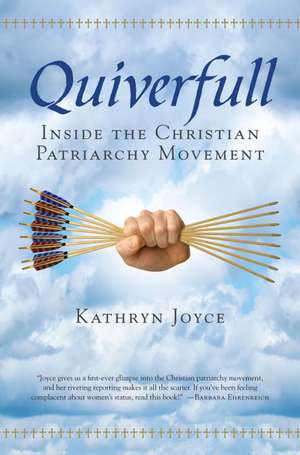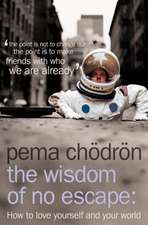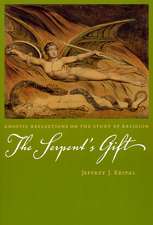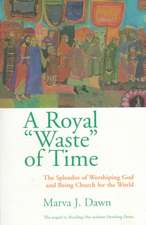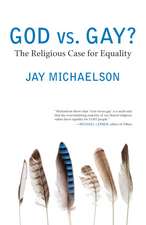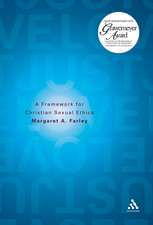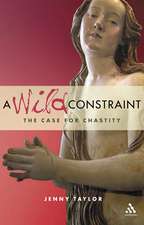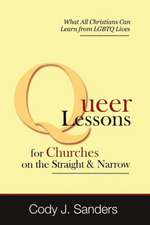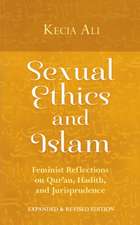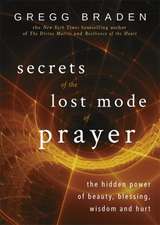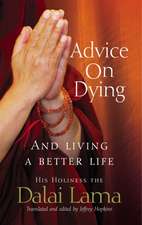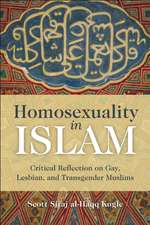Quiverfull: Inside the Christian Patriarchy Movement
Autor Kathryn Joyceen Limba Engleză Paperback – 30 apr 2010
Preț: 164.89 lei
Nou
Puncte Express: 247
Preț estimativ în valută:
31.56€ • 34.29$ • 26.53£
31.56€ • 34.29$ • 26.53£
Carte tipărită la comandă
Livrare economică 21 aprilie-05 mai
Preluare comenzi: 021 569.72.76
Specificații
ISBN-13: 9780807010730
ISBN-10: 0807010731
Pagini: 258
Dimensiuni: 152 x 229 x 25 mm
Greutate: 0.41 kg
Editura: Beacon Press (MA)
ISBN-10: 0807010731
Pagini: 258
Dimensiuni: 152 x 229 x 25 mm
Greutate: 0.41 kg
Editura: Beacon Press (MA)
Notă biografică
Kathryn Joyce is a freelance journalist whose writing has appeared on Salon and in the Nation, Mother Jones, Newsweek, Double X, and other publications. She lives in New York City.
Extras
From chapter two, "The Church Comes Home"
Conservative Christians may say they have no use for feminism, but increasingly, over the past twenty years, feminism—that is, sworn enmity to it—has become a rallying point for conservative and orthodox believers ranging from evangelicals to Catholics to Mormons to Reformed Protestants to fundamentalists, almost a stronger organizing principle than particular doctrines themselves. Feminism, as they see it, is what started it all. Mary Pride, an early leader in the homeschool movement and publisher of the influential Practical Homeschooling magazine, was also author of The Way Home: Beyond Feminism, Back to Reality, a book published in 1985 that did much to recreate the homeschooling movement along patriarchal and militantly fertile lines. Pride sees feminism as combining a range of ills from communism to self-worship to witchcraft. The influence of feminists, she writes, can be seen in the “victimization” of women through no-fault divorce laws; in casual sex, which lowers women from protected wives to the level of “unpaid prostitutes”; in vice peddling, such as cigarette and alcohol companies “cashing in” on displaced homemakers whose husbands have left them; and in lower wages for husbands with the abolishment of the gender-weighted “family wage” (paying men more than women on the argument that they were working to support dependents, while women were working for “extra” income). Not to mention what Pride sees as the cause-and-effect slide from socially sanctioned birth control to legalized abortion.
But the most troubling aspect of feminism to Pride, along with a wide-ranging band of fellow believers, whether they call themselves patriarchalists, antifeminists, complementarians (as opposed to egalitarians, feminism’s mild evangelical cousins), or proponents of biblical manhood and womanhood, isn’t any of its specific sins, but its acceptance by Christians, allowing the philosophy of the enemy to strike at Christ’s church.
“Christians have accepted feminists’ moderate demands for family planning and careers while rejecting the radical side of feminism—meaning lesbianism and abortion,” she writes. “What most do not see is that one demand leads to the other. Feminism is a totally self-consistent system aimed at rejecting God’s role for women. Those who adopt any part of its lifestyle can’t help picking up its philosophy. And those who pick up its philosophy are buying themselves a one-way ticket to social anarchy.” Pride isn’t suggesting some easy reversion to the Ozzie and Harriet model of the 1950s, but something more extreme. “Feminism is self-consistent. The Christianity of the fifties wasn’t. Feminists had a plan for women. Christians didn’t.”
But since, and in large part due to, Pride’s writing, Christians do have a plan: a “whole-cloth,” integrated lifestyle for women. It is not about independence and self-fulfillment but submissive wives following the leadership of patriarch husbands, working at home to educate their children and support their husband through his work, rest, and ministry, and “dying to the self ”—a Christ-like self-abnegation and acceptance of God’s plan for their role in life as helpmeets to their husbands. This biblical womanhood, encompassing homework, motherhood, and wifehood as they were lived not in the 1950s but in a notion of preindustrial, preߝhousehold appliance times, is what Pride calls a “total lifestyle”—as comprehensive as the pervasive influence of feminism, which has reached every part of women’s work lives, biology, and thinking. And this time around, the antifeminists intend to be fiercely diligent—rooting out the worldly, “feministic” ideas and influences in their churches, entertainment, and own thinking and making sure it doesn’t come back.
In a way, to that minority of American women who actually do claim the title “feminist”—a rarity bemoaned by both feminists and antifeminists alike, who both see the majority of women living out feminist ideals without recognizing or acknowledging their roots in the women’s liberation movement—this heated attention and estimation of feminist power is strangely flattering. Nobody has taken the feminist threat to decency and order this seriously since the 1970s. But it’s less amusing to realize that the movement against feminism, including all its unacknowledged aspects, such as the acceptance of women’s careers, the expectation of pay equity, a greater degree of sexual freedom and bodily self-determination, more equitable divisions of housework and childcare, and shared decision-making between husbands and wives, is being undertaken on a large scale by a coalition that goes far beyond the home-schooling community with its separatist ethos, yet which has echoed the ideas of men and women as extreme as Doug Phillips and Mary Pride with surprising fidelity.
John Piper and Wayne Grudem, both Reformed Baptist preachers and theologians, are leading members of the Council on Biblical Manhood and Womanhood (CBMW), an organization founded in 1987 with the goal of fighting feminist or egalitarian influences in the evangelical church. Piper and Grudem targeted the modest trend of “Christian feminism,” a gentler notion of equality than mainstream feminism that was sparked in part by moderate theologians questioning the long-held assumptions of evangelical churches that women should be barred from positions of church authority or, in some denominations, from speaking in church at all. Christian egalitarians also believe that the church shouldn’t discourage women’s careers outside the home and that family planning decisions are best left within the family.
But even such tepid endorsements of gender equality were threatening to established patriarchal traditions, and the CBMW was formed as a rebuttal. The Council, which today spreads its message through the sixteen-million-member Southern Baptist Convention, the conservative Presbyterian Church in America, and the evangelical ministry Campus Crusade for Christ, grew out of the publication of the “Danvers Statement,” an antiegalitarian document signed by dozens of theologians and pastors whose names have become synonymous within evangelical circles with Christian antifeminist activism. They include Beverly LaHaye, founder of Concerned Women for America and wife of Left Behind author Tim LaHaye; Dorothy Patterson, wife of Paige Patterson, one of the architects of the conservative takeover of the Southern Baptist Convention; Mary Kassian, a leading writer and conference speaker on biblical womanhood; CBMW board members Pat Robertson and Paige Patterson; and a number of men pushing the evangelical church toward Reformed theology, more commonly known as Calvinism or Puritanism: John MacArthur, Jr., R.C. Sproul, Sr., D.A. Carson, and dozens of others. Heavyweight contenders in the theological-political realm have also contributed essays and support to the CBMW, such as Albert Mohler, president of the Southern Baptist Theological Seminary, which steers the doctrine of the mammoth denomination. In an essay for CBMW, Mohler called for courageous action in reestablishing traditional gender roles throughout American Christendom. And Piper today disseminates his complementarian theology through his popular “Desiring God” ministry, church “plants” (expanding a network of churches like a franchise from his own Minnesota-based church), and conference series.
The Danvers Statement, which stands as the Council’s call to arms, holds that “widespread uncertainty and confusion in our culture regarding the complementary differences between masculinity and femininity,” the promotion of feminist egalitarianism, ambivalence toward motherhood and homemaking, calls for female church leadership, and “growing claims of legitimacy” for “illicit” sexual relationships—that is, gay rights—had all jeopardized the authority of Scripture, making theology too confusing for “ordinary people” who depend on the Bible’s literalism for direction. Such laity, the Council warned, would be thrown into uncertainty, and perhaps doubt, by an “evolved” standard on gender that seemed to contradict the given Word: if God’s revelations on the sexes were up for modernization, why not the rest? And the careless threat to the faith, they argued, was all in the name of the church accommodating the world rather than seeking to shape that world to the standards of the gospel.
The founding purpose of the Council was, in short, to counteract these influences by promoting a biblical view of the relationship between men and women, at home and in the church, through academic and popular publications. They sought to encourage lay people to study Scripture as a literal guide for biblical gender roles and relations and apply these guidelines to their lives, and thereby heal “people and relationships injured by an inadequate grasp of God’s will concerning manhood and womanhood; to help both men and women realize their full ministry potential through a true understanding and practice of their God-given roles, and to promote the spread of the gospel among all peoples by fostering a biblical wholeness in relationships that will attract a fractured world.”
In other words, the Council on Biblical Manhood and Womanhood sought to make marriages that look like a return to well-ordered harmony an advertisement for the church. In a world grappling with the growing pains of new demands for marital fair play and with the breakups of marriages where partners no longer felt obliged to sacrifice their needs and desires for the sake of an unequal partnership or to stay in unions that had simply been a bad match from the start, the Council hoped the appearance of secure, settled marriages would draw people to the faith. Sensitive to the appeal of feminism to people concerned about domestic violence and the abuse born out of male domination of women, Piper and Grudem lay such abuses of power at the foot of feminism as well, arguing that “wife abuse (and husband abuse) have some deep roots in the failure of parents to teach boys and girls about true masculinity and femininity. The confusion about sexual roles explodes in violent behaviors.” In this way, abusive men, passive men, and gay men could be linked together as sinners failing in their roles as men in a culture that has lost its way.
Shortly after the formation of the Council in 1991, Piper and Grudem, along with a number of their fellow Council members, published a guidebook for their mission, Recovering Biblical Manhood and Womanhood: A Response to Evangelical Feminism, composed of essays by pastors, theologians, and a handful of women (three out of twenty-two authors were female). In a new preface to the book, reprinted in 2006, they argued that the urgency of leading “Christian women back to a joyous embrace of godly male leadership in the church” was that the core of the issue was biblical authority—the truth of Scripture itself. “If we write off, ignore, or distort the Bible’s teachings on gender roles, then we are bound to do so with everything the Bible teaches,” they wrote. Acceptance of these teachings amidst a culture that had departed from them, they recognized, depended on acceptance and insistence of the literal truth of the Bible as the divine word of God rather than seeing it as a culturally influenced, time-bound document that represents the patriarchal views of the men and culture which put the words to paper.
As Mary Kassian writes in The Feminist Mistake: The Radical Impact of Feminism on Church and Culture, the threat of feminism is a three-stage process that ends with the rejection of God: “Feminism began with a deconstruction of a Judeo-Christian view of womanhood (the right to name self ); progressed to the deconstruction of manhood, gender relationships, family/societal structures, and a Judeo-Christian world-view (the right to name the world); and concluded with the concept of a metaphysical pluralism, self-deification, and the rejection of the Judeo-Christian deity (the right to name God).”
In other words, by allowing women to declare for themselves who and what they are, the definition of manhood, the meaning of which complementarians find principally in manhood’s differences from womanhood, comes under attack, as do hierarchical relationships within marriage. Eventually, God’s word and God Himself become an image considered in the eye of the beholder—whatever we want Him to be— and therefore no basis for hard and fast rules to live by.
Conservative Christians may say they have no use for feminism, but increasingly, over the past twenty years, feminism—that is, sworn enmity to it—has become a rallying point for conservative and orthodox believers ranging from evangelicals to Catholics to Mormons to Reformed Protestants to fundamentalists, almost a stronger organizing principle than particular doctrines themselves. Feminism, as they see it, is what started it all. Mary Pride, an early leader in the homeschool movement and publisher of the influential Practical Homeschooling magazine, was also author of The Way Home: Beyond Feminism, Back to Reality, a book published in 1985 that did much to recreate the homeschooling movement along patriarchal and militantly fertile lines. Pride sees feminism as combining a range of ills from communism to self-worship to witchcraft. The influence of feminists, she writes, can be seen in the “victimization” of women through no-fault divorce laws; in casual sex, which lowers women from protected wives to the level of “unpaid prostitutes”; in vice peddling, such as cigarette and alcohol companies “cashing in” on displaced homemakers whose husbands have left them; and in lower wages for husbands with the abolishment of the gender-weighted “family wage” (paying men more than women on the argument that they were working to support dependents, while women were working for “extra” income). Not to mention what Pride sees as the cause-and-effect slide from socially sanctioned birth control to legalized abortion.
But the most troubling aspect of feminism to Pride, along with a wide-ranging band of fellow believers, whether they call themselves patriarchalists, antifeminists, complementarians (as opposed to egalitarians, feminism’s mild evangelical cousins), or proponents of biblical manhood and womanhood, isn’t any of its specific sins, but its acceptance by Christians, allowing the philosophy of the enemy to strike at Christ’s church.
“Christians have accepted feminists’ moderate demands for family planning and careers while rejecting the radical side of feminism—meaning lesbianism and abortion,” she writes. “What most do not see is that one demand leads to the other. Feminism is a totally self-consistent system aimed at rejecting God’s role for women. Those who adopt any part of its lifestyle can’t help picking up its philosophy. And those who pick up its philosophy are buying themselves a one-way ticket to social anarchy.” Pride isn’t suggesting some easy reversion to the Ozzie and Harriet model of the 1950s, but something more extreme. “Feminism is self-consistent. The Christianity of the fifties wasn’t. Feminists had a plan for women. Christians didn’t.”
But since, and in large part due to, Pride’s writing, Christians do have a plan: a “whole-cloth,” integrated lifestyle for women. It is not about independence and self-fulfillment but submissive wives following the leadership of patriarch husbands, working at home to educate their children and support their husband through his work, rest, and ministry, and “dying to the self ”—a Christ-like self-abnegation and acceptance of God’s plan for their role in life as helpmeets to their husbands. This biblical womanhood, encompassing homework, motherhood, and wifehood as they were lived not in the 1950s but in a notion of preindustrial, preߝhousehold appliance times, is what Pride calls a “total lifestyle”—as comprehensive as the pervasive influence of feminism, which has reached every part of women’s work lives, biology, and thinking. And this time around, the antifeminists intend to be fiercely diligent—rooting out the worldly, “feministic” ideas and influences in their churches, entertainment, and own thinking and making sure it doesn’t come back.
In a way, to that minority of American women who actually do claim the title “feminist”—a rarity bemoaned by both feminists and antifeminists alike, who both see the majority of women living out feminist ideals without recognizing or acknowledging their roots in the women’s liberation movement—this heated attention and estimation of feminist power is strangely flattering. Nobody has taken the feminist threat to decency and order this seriously since the 1970s. But it’s less amusing to realize that the movement against feminism, including all its unacknowledged aspects, such as the acceptance of women’s careers, the expectation of pay equity, a greater degree of sexual freedom and bodily self-determination, more equitable divisions of housework and childcare, and shared decision-making between husbands and wives, is being undertaken on a large scale by a coalition that goes far beyond the home-schooling community with its separatist ethos, yet which has echoed the ideas of men and women as extreme as Doug Phillips and Mary Pride with surprising fidelity.
John Piper and Wayne Grudem, both Reformed Baptist preachers and theologians, are leading members of the Council on Biblical Manhood and Womanhood (CBMW), an organization founded in 1987 with the goal of fighting feminist or egalitarian influences in the evangelical church. Piper and Grudem targeted the modest trend of “Christian feminism,” a gentler notion of equality than mainstream feminism that was sparked in part by moderate theologians questioning the long-held assumptions of evangelical churches that women should be barred from positions of church authority or, in some denominations, from speaking in church at all. Christian egalitarians also believe that the church shouldn’t discourage women’s careers outside the home and that family planning decisions are best left within the family.
But even such tepid endorsements of gender equality were threatening to established patriarchal traditions, and the CBMW was formed as a rebuttal. The Council, which today spreads its message through the sixteen-million-member Southern Baptist Convention, the conservative Presbyterian Church in America, and the evangelical ministry Campus Crusade for Christ, grew out of the publication of the “Danvers Statement,” an antiegalitarian document signed by dozens of theologians and pastors whose names have become synonymous within evangelical circles with Christian antifeminist activism. They include Beverly LaHaye, founder of Concerned Women for America and wife of Left Behind author Tim LaHaye; Dorothy Patterson, wife of Paige Patterson, one of the architects of the conservative takeover of the Southern Baptist Convention; Mary Kassian, a leading writer and conference speaker on biblical womanhood; CBMW board members Pat Robertson and Paige Patterson; and a number of men pushing the evangelical church toward Reformed theology, more commonly known as Calvinism or Puritanism: John MacArthur, Jr., R.C. Sproul, Sr., D.A. Carson, and dozens of others. Heavyweight contenders in the theological-political realm have also contributed essays and support to the CBMW, such as Albert Mohler, president of the Southern Baptist Theological Seminary, which steers the doctrine of the mammoth denomination. In an essay for CBMW, Mohler called for courageous action in reestablishing traditional gender roles throughout American Christendom. And Piper today disseminates his complementarian theology through his popular “Desiring God” ministry, church “plants” (expanding a network of churches like a franchise from his own Minnesota-based church), and conference series.
The Danvers Statement, which stands as the Council’s call to arms, holds that “widespread uncertainty and confusion in our culture regarding the complementary differences between masculinity and femininity,” the promotion of feminist egalitarianism, ambivalence toward motherhood and homemaking, calls for female church leadership, and “growing claims of legitimacy” for “illicit” sexual relationships—that is, gay rights—had all jeopardized the authority of Scripture, making theology too confusing for “ordinary people” who depend on the Bible’s literalism for direction. Such laity, the Council warned, would be thrown into uncertainty, and perhaps doubt, by an “evolved” standard on gender that seemed to contradict the given Word: if God’s revelations on the sexes were up for modernization, why not the rest? And the careless threat to the faith, they argued, was all in the name of the church accommodating the world rather than seeking to shape that world to the standards of the gospel.
The founding purpose of the Council was, in short, to counteract these influences by promoting a biblical view of the relationship between men and women, at home and in the church, through academic and popular publications. They sought to encourage lay people to study Scripture as a literal guide for biblical gender roles and relations and apply these guidelines to their lives, and thereby heal “people and relationships injured by an inadequate grasp of God’s will concerning manhood and womanhood; to help both men and women realize their full ministry potential through a true understanding and practice of their God-given roles, and to promote the spread of the gospel among all peoples by fostering a biblical wholeness in relationships that will attract a fractured world.”
In other words, the Council on Biblical Manhood and Womanhood sought to make marriages that look like a return to well-ordered harmony an advertisement for the church. In a world grappling with the growing pains of new demands for marital fair play and with the breakups of marriages where partners no longer felt obliged to sacrifice their needs and desires for the sake of an unequal partnership or to stay in unions that had simply been a bad match from the start, the Council hoped the appearance of secure, settled marriages would draw people to the faith. Sensitive to the appeal of feminism to people concerned about domestic violence and the abuse born out of male domination of women, Piper and Grudem lay such abuses of power at the foot of feminism as well, arguing that “wife abuse (and husband abuse) have some deep roots in the failure of parents to teach boys and girls about true masculinity and femininity. The confusion about sexual roles explodes in violent behaviors.” In this way, abusive men, passive men, and gay men could be linked together as sinners failing in their roles as men in a culture that has lost its way.
Shortly after the formation of the Council in 1991, Piper and Grudem, along with a number of their fellow Council members, published a guidebook for their mission, Recovering Biblical Manhood and Womanhood: A Response to Evangelical Feminism, composed of essays by pastors, theologians, and a handful of women (three out of twenty-two authors were female). In a new preface to the book, reprinted in 2006, they argued that the urgency of leading “Christian women back to a joyous embrace of godly male leadership in the church” was that the core of the issue was biblical authority—the truth of Scripture itself. “If we write off, ignore, or distort the Bible’s teachings on gender roles, then we are bound to do so with everything the Bible teaches,” they wrote. Acceptance of these teachings amidst a culture that had departed from them, they recognized, depended on acceptance and insistence of the literal truth of the Bible as the divine word of God rather than seeing it as a culturally influenced, time-bound document that represents the patriarchal views of the men and culture which put the words to paper.
As Mary Kassian writes in The Feminist Mistake: The Radical Impact of Feminism on Church and Culture, the threat of feminism is a three-stage process that ends with the rejection of God: “Feminism began with a deconstruction of a Judeo-Christian view of womanhood (the right to name self ); progressed to the deconstruction of manhood, gender relationships, family/societal structures, and a Judeo-Christian world-view (the right to name the world); and concluded with the concept of a metaphysical pluralism, self-deification, and the rejection of the Judeo-Christian deity (the right to name God).”
In other words, by allowing women to declare for themselves who and what they are, the definition of manhood, the meaning of which complementarians find principally in manhood’s differences from womanhood, comes under attack, as do hierarchical relationships within marriage. Eventually, God’s word and God Himself become an image considered in the eye of the beholder—whatever we want Him to be— and therefore no basis for hard and fast rules to live by.
Recenzii
Engrossing . . . Skillfully reported by journalist Kathryn Joyce, Quiverfull has echoes of The Handmaid's Tale. Unfortunately, it's not fiction.—Rebecca Braverman, Bust
"An invaluable contribution to understanding how religious fundamentalism still stands in the way of sexual justice . . . An urgent call to dismantle fundamentalism's hold on our politics, and our policy-making."—Sarah Posner, American Prospect online
"Insightful . . . A call to reexamine our own beliefs . . . The issues Joyce's book raises are fundamental to our identity as human beings, and as Christians. Perhaps they could stand some reexamination."—Elrena Evans, Christianity Today
"[An] excellent, frightening new book . . . Quiverfull merits wide readership."—Edd Doerr, The Voice of Reason: Journal of Americans for Religious Liberty
"Riveting and deeply disturbing. This important book shines a light on a corner of the Christian right that has taken misogyny to sadomasochistic extremes, and reveals the sexual anxieties so often underlying modern fundamentalism."—Michelle Goldberg, author of Kingdom Coming
"Joyce gives us a first-ever glimpse into the Christian patriarchy movement, and her riveting reporting makes it all the scarier. If you've been feeling complacent about women's status, read this book!—Barbara Ehrenreich
"A groundbreaking investigation . . . Future historians and journalists will owe Joyce a debt of gratitude for her foray into this still nascent religious group."—Publishers Weekly
"An invaluable contribution to understanding how religious fundamentalism still stands in the way of sexual justice . . . An urgent call to dismantle fundamentalism's hold on our politics, and our policy-making."—Sarah Posner, American Prospect online
"Insightful . . . A call to reexamine our own beliefs . . . The issues Joyce's book raises are fundamental to our identity as human beings, and as Christians. Perhaps they could stand some reexamination."—Elrena Evans, Christianity Today
"[An] excellent, frightening new book . . . Quiverfull merits wide readership."—Edd Doerr, The Voice of Reason: Journal of Americans for Religious Liberty
"Riveting and deeply disturbing. This important book shines a light on a corner of the Christian right that has taken misogyny to sadomasochistic extremes, and reveals the sexual anxieties so often underlying modern fundamentalism."—Michelle Goldberg, author of Kingdom Coming
"Joyce gives us a first-ever glimpse into the Christian patriarchy movement, and her riveting reporting makes it all the scarier. If you've been feeling complacent about women's status, read this book!—Barbara Ehrenreich
"A groundbreaking investigation . . . Future historians and journalists will owe Joyce a debt of gratitude for her foray into this still nascent religious group."—Publishers Weekly
Cuprins
Introduction
Part One Wives
Chapter 1 Massachusetts Hope
Chapter 2 The Church Comes Home
Chapter 3 The Men Who Would Be Kings
Chapter 4 The New Reformation
Chapter 5 Titus 2: Submission and War
Chapter 6 Titus 2 in Tennessee
Chapter 7 No Greater Joy
Chapter 8 Submission and Abuse
Chapter 9 The Small World of Vision Forum
Chapter 10 Life in the Garden
Part Two Mothers
Chapter 11 Be Fruitful and Multiply
Chapter 12 The Bible and Birth Control
Chapter 13 Trust and Obey
Chapter 14 Blessed Arrows
Chapter 15 The Natural Family
Chapter 16 Return to Patriarchy
Chapter 17 Godly Seeds
Chapter 18 Demographic Winter
Chapter 19 Exiting the Movement
Part Three Daughters
Chapter 20 Victory through Daughters
Conclusion
Acknowledgments
Part One Wives
Chapter 1 Massachusetts Hope
Chapter 2 The Church Comes Home
Chapter 3 The Men Who Would Be Kings
Chapter 4 The New Reformation
Chapter 5 Titus 2: Submission and War
Chapter 6 Titus 2 in Tennessee
Chapter 7 No Greater Joy
Chapter 8 Submission and Abuse
Chapter 9 The Small World of Vision Forum
Chapter 10 Life in the Garden
Part Two Mothers
Chapter 11 Be Fruitful and Multiply
Chapter 12 The Bible and Birth Control
Chapter 13 Trust and Obey
Chapter 14 Blessed Arrows
Chapter 15 The Natural Family
Chapter 16 Return to Patriarchy
Chapter 17 Godly Seeds
Chapter 18 Demographic Winter
Chapter 19 Exiting the Movement
Part Three Daughters
Chapter 20 Victory through Daughters
Conclusion
Acknowledgments
Descriere
A journalist's investigation of a Christian Right movement in which women put their fertility in the service of a patriarchal culture war, "Quiverfull" is a fascinating examination of the 21st-century women and men who proclaim submission as model virtues--and as warfare on behalf of Christ.
